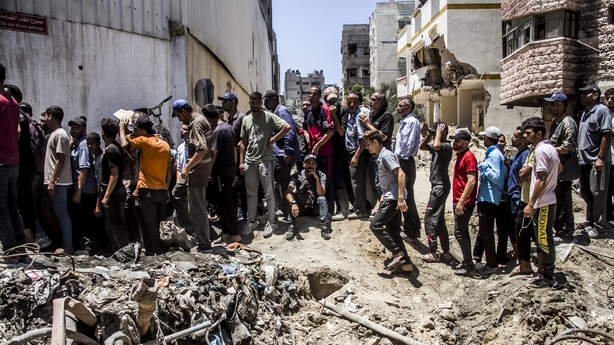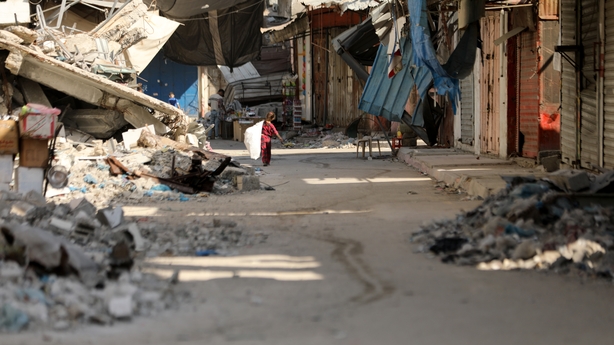The US Secretary of State Antony Blinken has said Hamas proposed "numerous changes" in its response to a ceasefire proposal to end the Gaza war including some unworkable changes, but he insisted the US and mediators will press ahead to bridge gaps between the Palestinian militant group and Israel.
Hamas formally responded to a ceasefire proposal outlined by US President Joe Biden on 31 May, that envisages a ceasefire and phased release of Israeli hostages in Gaza in exchange for Palestinians jailed in Israel, ultimately leading to a permanent end to the war.
"Hamas could have answered with a single word: Yes", Mr Blinken said at a news conference in Doha.
"Instead, Hamas waited nearly two weeks and then proposed more changes, a number of which go beyond positions that it had previously taken and accepted."
A Hamas official told journalists the response reaffirmed its stance that a ceasefire must lead to a permanent end to hostilities in Gaza, withdrawal of Israeli forces, reconstruction of the Palestinian enclave, and release of Palestinian prisoners in Israel.

Mr Blinken said some of Hamas's counter proposals were "workable" and that he believes the gaps that remain between the two sides can be bridged.
Negotiators from the US, Egypt and Qatar have been trying for months to mediate a ceasefire and free the hostages, more than 100 of whom are believed to remain captive in Gaza.
"But in the days ahead, we are going to continue to push on an urgent basis with our partners with Qatar, with Egypt, to try to close this deal," Mr Blinken said.
"We're determined to try to bridge the gaps, and I believe those gaps are bridgeable. Doesn't mean they will be bridged because again, it ultimately depends on people saying yes," he added.
Gaza war rages
Northern Israel came under repeated barrages of rocket fire from Hezbollah in Lebanon, a day after an Israeli air strike killed a senior commander of the militant group allied with Hamas.
Hamas and its allies, Islamic Jihad, said that their response calls for "a complete halt to the ongoing aggression on Gaza".
As the Gaza war has raged for more than eight months, claiming a spiralling civilian death toll in the besieged territory, deadly violence has also flared along Israel's northern border with Lebanon.
An Israeli strike yesterday killed Hezbollah commander Taleb Sami Abdallah, also known as Abu Taleb and described by a Lebanese military source as the group's "most important" fighter killed in the war so far.
This morning, air raid sirens blared across northern Israel as three waves of about 160 rockets and missiles filled the sky.
We need your consent to load this rte-player contentWe use rte-player to manage extra content that can set cookies on your device and collect data about your activity. Please review their details and accept them to load the content.Manage Preferences
Several were intercepted by Israeli air defences while others struck inside northern Israel sparking fires, the military said, reporting no casualties.
The Israeli military said its "artillery struck the sources of the fire" and that fighter jets bombed a launcher and four "terrorist infrastructure sites".
Israeli Prime Minister Benjamin Netanyahu warned last week that the army was "prepared for a very intense operation" along the Lebanese border and that "one way or another, we will restore security to the north".
UN condemns 'war crimes'
Israel's military also kept UP its bombardment and ground operations inside Gaza, where a pre-dawn air strike killed seven people in a family house in Gaza City, the Baptist Hospital said.
Further south, a child was killed and several wounded in an Israeli bombardment targeting a house in Rafah, a medic at Al-Nasser Hospital said. Air strikes and shelling also hit the city of Khan Yunis.
The Israeli military said that "over the past day the troops eliminated a number of armed terrorist cells in close-quarters encounters" in Rafah, and that the air force struck "over 30 terror targets throughout the Gaza Strip".
The devastating war has sparked a global outcry and demands for Israel to end it, with the UN Security Council and major world and Arab powers voicing support for the proposed ceasefire.
"The horror must stop," UN chief Antonio Guterres told a Gaza aid conference in Jordan yesterday.
A UN investigation concluded that Israel has committed crimes against humanity during the war in Gaza, including that of "extermination", and that Israeli and Palestinian armed groups had both committed war crimes.

The Commission of Inquiry, established by the UN Human Rights Council, noted "a widespread or systematic attack directed against the civilian population in Gaza" including "starvation as a method of warfare".
It also concluded that members of Hamas, other Palestinian armed groups and civilians participating in the 7 October attack "deliberately killed, injured, mistreated, took hostages and committed sexual and gender-based violence".
Israel rejected the conclusions, accusing the UN commission of "systematic anti-Israeli discrimination".
The war broke out after Hamas's 7 October attack resulted in the deaths of 1,194 people in Israel, mostly civilians, according to an AFP tally based on Israeli official figures.
The militants also seized 251 hostages. Of these 116 remain in Gaza, although the army says 41 of them are dead.
The Israeli army launched a devastating offensive on Gaza that has left at least 37,164 people dead, the majority of them civilians, according to the Hamas-ruled territory's health ministry.

